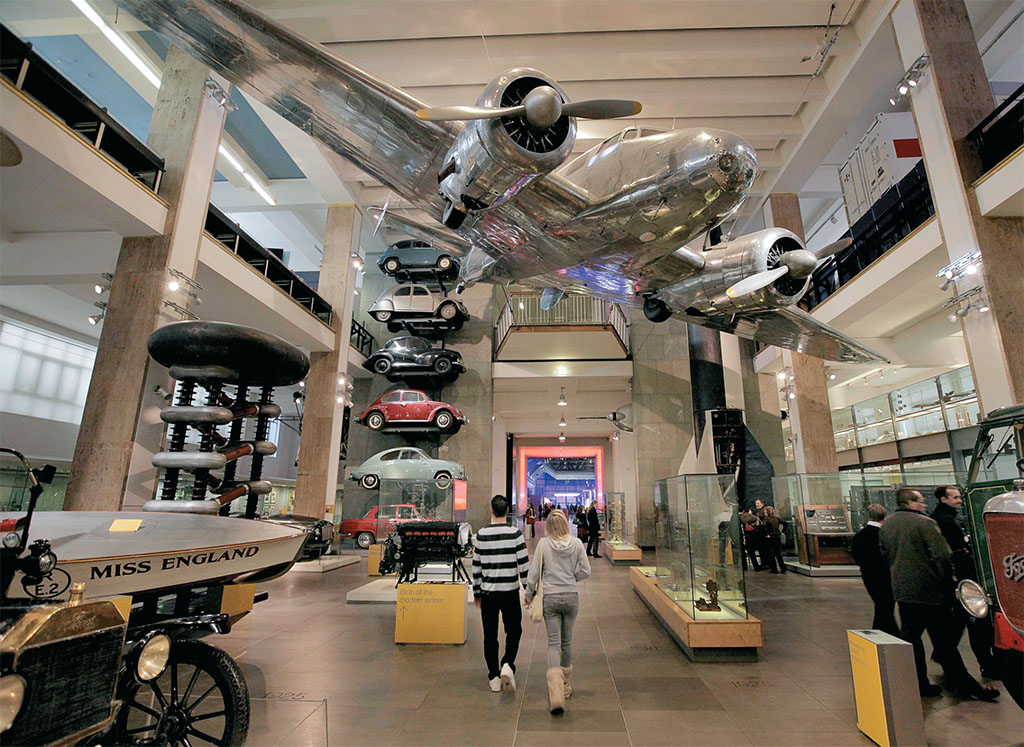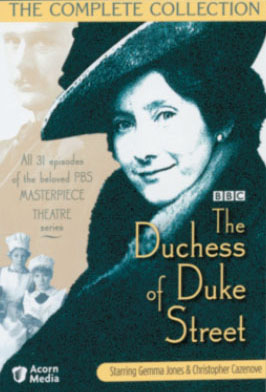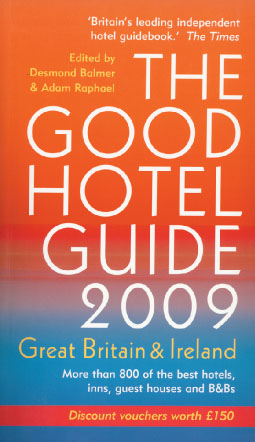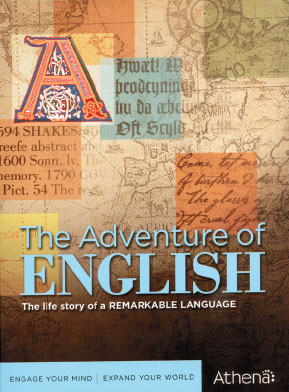
Celebrating a Century of Science
MUSEUM
The Science Museum
Exhibition Road South Kensington London SW7 2DD www.sciencemuseum.org.uk
YOU CAN BE forgiven if the Science Museum has not been on your London agenda. After all, we visit London for many reasons—history, the arts, shopping, theater and the incredible verve of this world capital. Few of us, however, visit Britain for science, of all things.
Perhaps this year, however, the 100th anniversary of this world-class museum may provide just the right reason to put the Science Museum on your to-do list. Regardless of your predilections, it can only be a pleasant surprise. Six floors of exhibitions and galleries are bound to hold something for every interest: the history of agriculture, of computing, mathematics, medicine or plastics.
The 1814 Puffing Billy locomotive is the oldest surviving steam locomotive in the world. It pulled coal wagons at a walking pace five miles from a colliery to the River Tyne. It stands in the gallery called “Making the Modern World,” next to Stephenson’s famous “Rocket” built in 1829. A 1916 Ford Model T, meanwhile, rests near the Apollo 10 1969 lunar command module. We’ve come a long way in 80 years.
Among the many fascinating working exhibits is a 1959 Pegasus computer—the only one of 40 such machines still in working order. Their principal function was making stress calculations in aircraft design. It has been kept going by members of the Computer Conservation Society since 1981. With a 233 kh clock speed, 200 kilobit memory and 2 kilobit RAM, Pegasus won’t put your laptop out of business. It cost £45,000.
And that perhaps is the real glory of the Science Museum. It shows us not only the secrets of the world in which we live today, but it reminds us how we got here. It’s a great visit.
[caption id="BeyondtheBookshelf_img1" align="aligncenter" width="1024"]

COURTESY OF THE SCIENCE MUSEUM
From scullery maid to the toast of the town
DVD
The Duchess of Duke Street, 10-disc boxed set, Acorn Media, Silver Springs, Md., 31 episodes, app. 27 hours, &doller;99.95.
[caption id="BeyondtheBookshelf_img2" align="aligncenter" width="266"]

THREE DECADES HAVE PASSED since the Masterpiece Theater broadcast of this BBC drama series; a whole new generation awaits introduction to one of the classics of British film drama.
Set in London between 1900 and 1925, The Duchess of Duke Street is loosely based on the career of Rosa Lewis, who ran the Cavendish Hotel in Piccadilly and was affectionately known as “the Duchess of Jermyn Street.” Created by John Hawkesworth (producer of Upstairs, Downstairs), the series stars Gemma Jones as Louisa Trotter, who works her way up from scullery maid to acclaimed society cook to proprietress of the upper-crust Bentinck Hotel in Marylebone.
From the last days of Queen Victoria, through the Edwardian years and world war I to the jazz age of the 20s, we follow the indomitable Louisa, the staff of the Bentinck and its tony assemblage of regular guests through years of upstairs, downstairs life. Their lives and their stories are full of humor and heart.
With 31 50-minute episodes, The Duchess of Duke Street is hardly a miniseries. Rather this outstanding standard of BBC excellence affords hours of viewing, whether rushed together or spread out over a long, hot summer. It becomes impossible not to care for the people – the aging waiter Merriman, Louisa’s loyal welsh assistant Mary, Louisa’s lover Lord Haslemere, the regular denizens of the Bentinck and for Louisa Trotter, who never loses her Cockney accent or attitude.
Acorn Media has done it again, making available this outstanding and most human of BBC epics.
To find that perfect place to stay
BOOK
The Good Hotel Guide 2009, The Good Hotel Guide Ltd., London 576 pages, softcover, L20.
[caption id="BeyondtheBookshelf_img3" align="aligncenter" width="255"]

HERE IS A TRULY independent hotel guide. Forget the stars and the ratings; forget the commercial palaver of many guides in which hotels pay for their inclusion. The Good Hotel Guide sets a different kind of standard, and aims to give readers impartial advice on finding just the right place for them.
Readers themselves often provide reports for the entries, giving the book a genuine “word of mouth” flavor. In fact, they are encouraged to do so.
Most of the hotels included here are independent hotels rather than chain hotels. Many of them are really more bed-and-breakfasts or guest houses than what we think of as hotels. What they have in common is that they have been chosen for the warmth of their welcome and high standards of flexible service.
The descriptive narrative entries for each property are delightful and personal, full of comments sent in by enthusiastic travelers. Compared to most guides they have an amateur flavor and are certainly unevenly written. The sidebars of practical information are helpful, comprehensive and best of all, timely—as a new edition is published annually.
There are limitations to its usefulness, however: As its entries are alphabetic rather than geographic, you do need to know where you’re going. It has no pretense to being comprehensive, and whole areas are unrepresented. And it would be best not to rely on it for London.
With those caveats, however, The Good Hotel Guide is a breath of fresh air to read and to mine for gems of memorable experience.
DVD
The Adventure of English,
4-disc boxed set, Athena, Silver Springs, Md., 8 episodes, app. 408 minutes, &doller;79.95.
[caption id="BeyondtheBookshelf_img4" align="aligncenter" width="289"]

What’s in a tongue?
HOW DID THE ENGLISH language evolve from a minor German dialect in A.D. 500 to the vibrant world-dominating language that it is today? From Beowulf to William Tyndale’s Bible, Samuel Johnson’s Dictionary to the street slang of Calcutta, the Australian outback and Hollywood, the 1,500 year journey of the language is remarkable.
Author and broadcaster Melvin Bragg, chairman of Britain’s National Campaign for the Arts, hosts and narrates this superb eight-part series, taking us across the world and across the centuries.
During the dark years after the Norman Conquest, the English tongue almost died out. Instead, it carried the day as the language of the people. Indeed, the English language has shown itself to be remarkably adaptive, adoptive and resolutely resilient.
As the British Empire expanded across the globe, the language went with it. While English provided the framework for defining local culture and custom, it also drew freely on the vocabulary and idioms of indigenous people everywhere. It took on its own cadences and patois in such far flung places as New Zealand, America and India.
Today the Oxford English Dictionary lists almost 750,000 words—from classical Greek and Hindi, Australian aborigines and Native Americans, and words that would still be recognized by Anglo-Saxon warlords sitting around their 6th-century campfires.
This new series is imaginatively presented, traveling at a breath-taking pace around the world to trace the language’s etymology and tell the story of how the English language became the language of commerce, culture and diplomacy in the 21st century.
The Adventure of English is among the first releases of the Athena imprint, Acorn Media’s new line of documentary videos to promote lifelong learning. If Athena can sustain the level of quality shown here, its future should be bright and we are truly enriched.





Comments